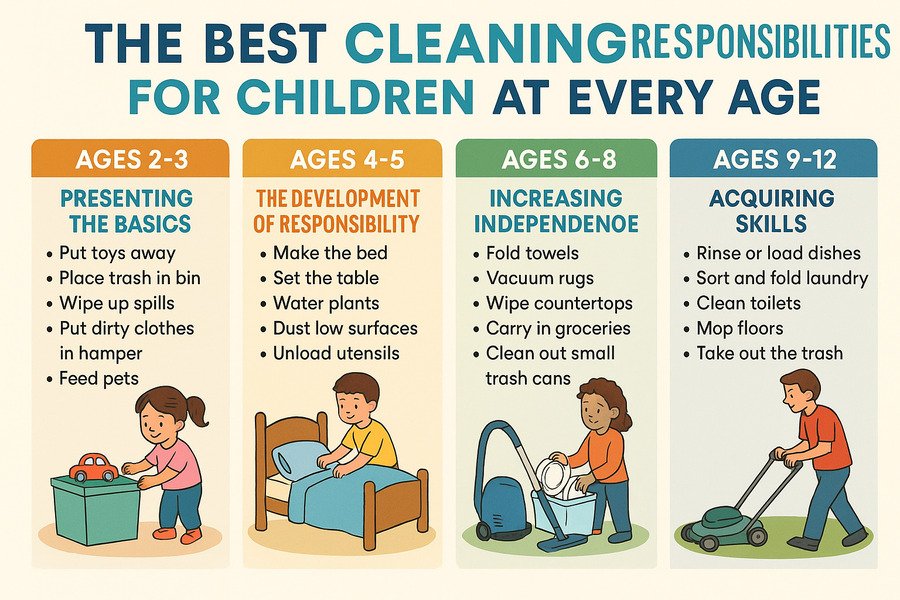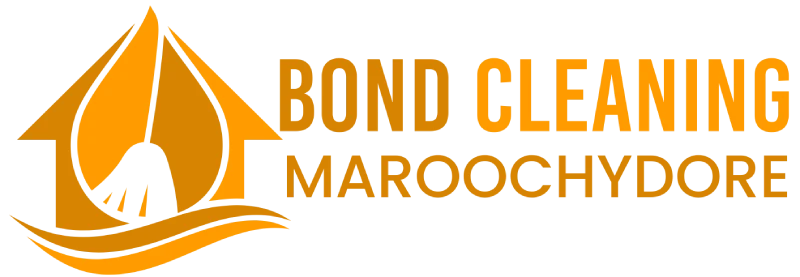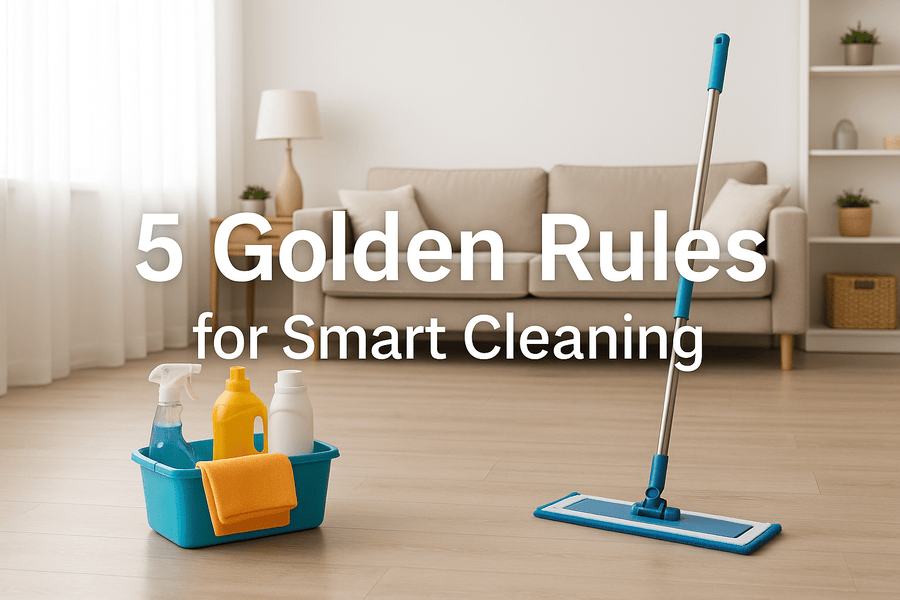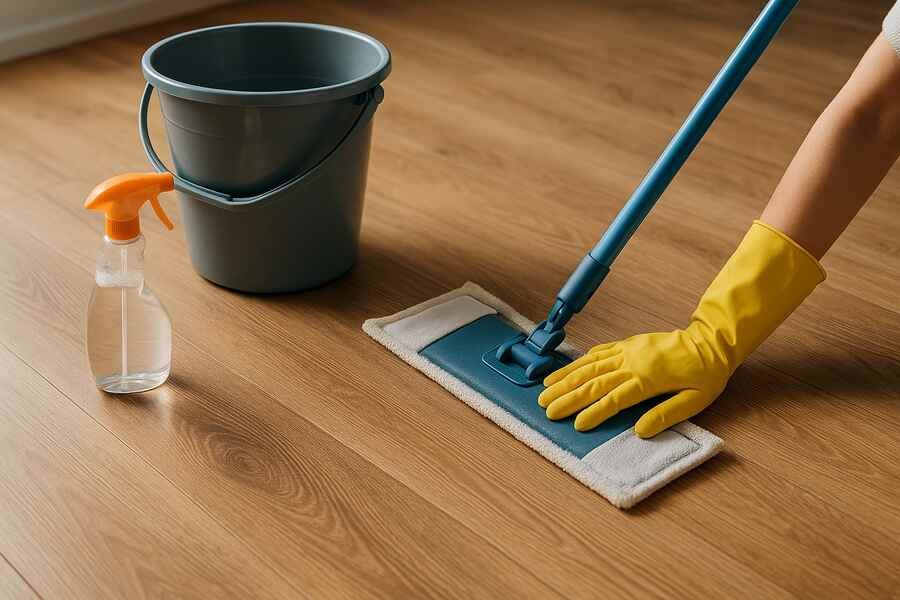The Best Cleaning Responsibilities for Children at Every Age

Cleaning Responsibilities for Kids at Every Age
Have you ever thought too early is teaching a child how to clean? The reality of the matter is- kids can do so much more than what we tend to believe. And doing age-appropriate chores is more than helpful when it comes to cleaning as well. It makes them responsible, independent and teaches them life skills that would last a lifetime. The guide has something to offer no matter how old your child is, whether it is making your toddler clean the toys they need to clean up or helping your teenager work out some kind of weekly schedule of chores. We will make tidying up enjoyable, feasible and a source of pride for your small ones with the final compiled list of age-appropriate cleaning tasks to allow kids to take part in.
1. Why Give Kids Cleaning Jobs?
Assigning your children chores does more than help you maintain a clean home, as per Bond Cleaning Maroochydore. It imparts to them important life lessons such as discipline, organizational and independence. When children are given some kind of responsibility, they feel a sense of meaning, and they also gain a sense of pride when they are given responsibility. This also makes them cooperate with others as well as teaches them household responsibilities, and makes them have high self-esteem.
2. Caring About Kids Cleaning Tips
To make chores effective, ensure that you do not make tasks complicated and age-appropriate for your child. Perfection can be increased by turning tasks into a game, such as racing against the clock or playing music. It is beneficial to include them in cleaning and praise them so that they are motivated when trying to learn by watching others. Finally, establish regularity by use of routines and visualisation, such as chore charts.
3. Ages 2-3: Presenting the Basics
At the same stage, when children are toddlers, they like imitating the forms of adult behaviour; hence, it is a good time to engage them in simple tasks. At the ages of 2-3, little people can assist in returning toys to Gillies or shelves, putting to trash small pieces of garbage, such as tissues and books in the correct places. They could also assist in cleaning some spills with a cloth and putting dirty clothes in the hamper. They can even feed pets when under supervision. These are to be directed, but with very soft words and positive reinforcement.
4. Ages 4-5: The development of responsibility
Preschoolers can take more responsibility and begin to learn about the need to clear up their messes. Within this age span, children will be able to start preparing their beds even though it might not be neat. They can assist in laying the table, watering the indoor plants and clearing dust off the low surfaces. Others, such as assisting in removing light objects in the dishwasher as well as sorting laundry according to colour, are also appropriate. They are also supposed to tidy their room with partial help. Their efforts will be enhanced through the use of childish language and praising them.
5. Ages 6-8: Increasing Independence
Children at this age are capable of doing more detailed tasks based on some degree of independence. Six- to eight-year-old children are ready to fold such simple objects as towels and clothes, vacuum small rugs or corners, and clean up countertops. They ought also to start carrying their school bags and cleaning of small trash bins. Cleaning smaller rooms and sorting their assets, such as books, shoes, or toys, will no longer be a problem for them. They will be able to start cleaning their rooms with less assistance and gain consistency and responsibility.
6. Ages 9-12: Acquiring Skills
Children aged 9-12 can handle more difficult and physically challenging tasks. They ought to be capable of rinsing dishes or loading and unloading the dishwasher. Sorting, folding washing become a possibility, and they can be empowered to clean toilets with non-toxic cleaners. Cleaning up the floors and disposing of the garbage may be a routine procedure. They are also willing to clean up their room, take the dog out, and, to some extent, prepare their meals without being told. This age is old enough to learn time management using a chore calendar.
7. 13 years old and above: Practising Real Life
Adolescents would be willing to take up cleaning duties on a large scale and would even assist in running the household to a greater degree. They would be able to clean kitchens and baths thoroughly and mow the lawn or do something with the yard. They may include such tasks as grocery shopping when there is a list, complete cooking, and the ironing of clothes. The teens can also be trusted with younger siblings, running their schedule, and doing laundry on their own as well. Make them take up responsibilities and reward them, or give out special privileges in order to develop a sense of responsibility.
8. Designing An Effective Chore System
In order to create an effective cleaning routine, start with simple chores assigned to the child according to age and ability. Put them on a chore chart or app to show them so they have a visual. Swap around the chores every week, so it is not so monotonous, and so that to can learn to be adaptable too. Be consistent in the expectations made to children and give rewards for actions and effort at times. Do not set a standard of perfection.
Conclusion
It is not only about teaching children how to keep the house clean. It is in enabling them to have life skills which enhance responsibility and independence. Whether it is a cleanup of simple toys or handling laundry, all these are steps towards the creation of confident and able individuals. Therefore, begin early, be regular and enjoy the group effort involved in cleaning together.



